Key takeaways:
- Networking is about building genuine connections through authentic interactions, not just exchanging information.
- Curiosity and vulnerability facilitate meaningful conversations and deeper relationships in networking situations.
- Failing to prepare or sticking to familiar faces can hinder networking opportunities; active listening and engaging with diverse perspectives are crucial.
- Follow-up after networking events can solidify initial connections and lead to meaningful opportunities.
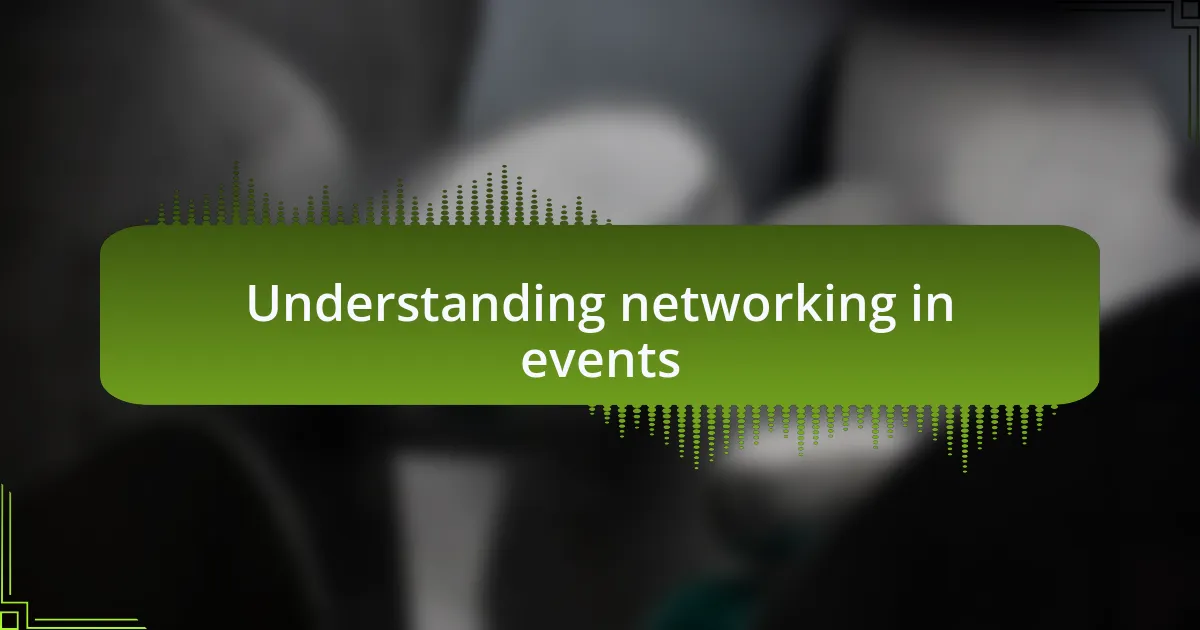
Understanding networking in events
Networking at events is about more than just exchanging business cards; it’s a chance to build meaningful connections. I remember attending an audiovisual expo where I felt overwhelmed by the crowd. Instead of sticking to my usual game plan, I decided to strike up a simple conversation with the person next to me. That small step led to sharing insights about emerging trends in our industry, proving that genuine interactions often yield the richest rewards.
Have you ever found yourself standing alone at an event, unsure of how to approach someone? It can be intimidating, but I’ve learned that a well-placed question can open doors. At one workshop, I approached a speaker during a break and asked about their latest project. This not only eased my nerves, but it also sparked a dialogue that later resulted in a collaborative opportunity. It made me realize that curiosity can be one of the most effective tools in networking.
Understanding the essence of networking lies in recognizing the power of vulnerability. I once shared a personal challenge I faced while organizing an audiovisual project, and to my surprise, others resonated with my story. That moment transformed the atmosphere, shifting from formal introductions to real conversations. It highlighted how authenticity can facilitate deeper connections, encouraging others to share their experiences too.
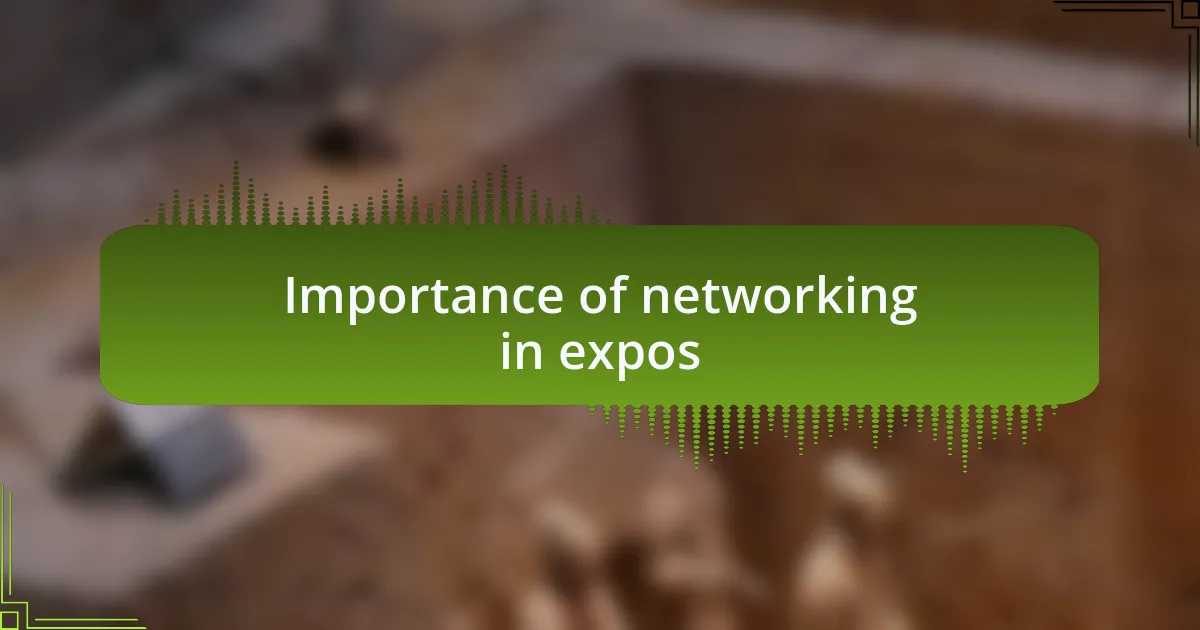
Importance of networking in expos
Networking in expos opens doors that can change the course of your career. At one event, I noticed a booth showcasing cutting-edge technology I was genuinely excited about. Striking up a conversation with the team there led to not only learning about their innovative solutions but also to an invitation for a behind-the-scenes tour. That experience reshaped my understanding of how discussions at expos can lead to unexpected opportunities.
Why is it that some people seem to thrive in networking situations while others struggle? I think it’s partly about mindset. At a recent expo, I approached a fellow attendee with self-doubt creeping in, thinking they’d be too busy for a chat. To my surprise, they welcomed my approach and shared their journey of overcoming similar challenges. That moment reminded me that vulnerability fosters connection; we’re more alike than we often realize, and being open can lead to meaningful relationships.
The magic in networking lies in serendipity. I once found myself seated next to someone during a panel discussion who had a completely different background but shared a passion for audiovisual storytelling. Sharing insights about our respective fields opened up a fascinating dialogue. It’s incredible how a simple conversation can evolve into a partnership, highlighting the fact that every expo is a treasure trove of possibilities waiting to be uncovered.
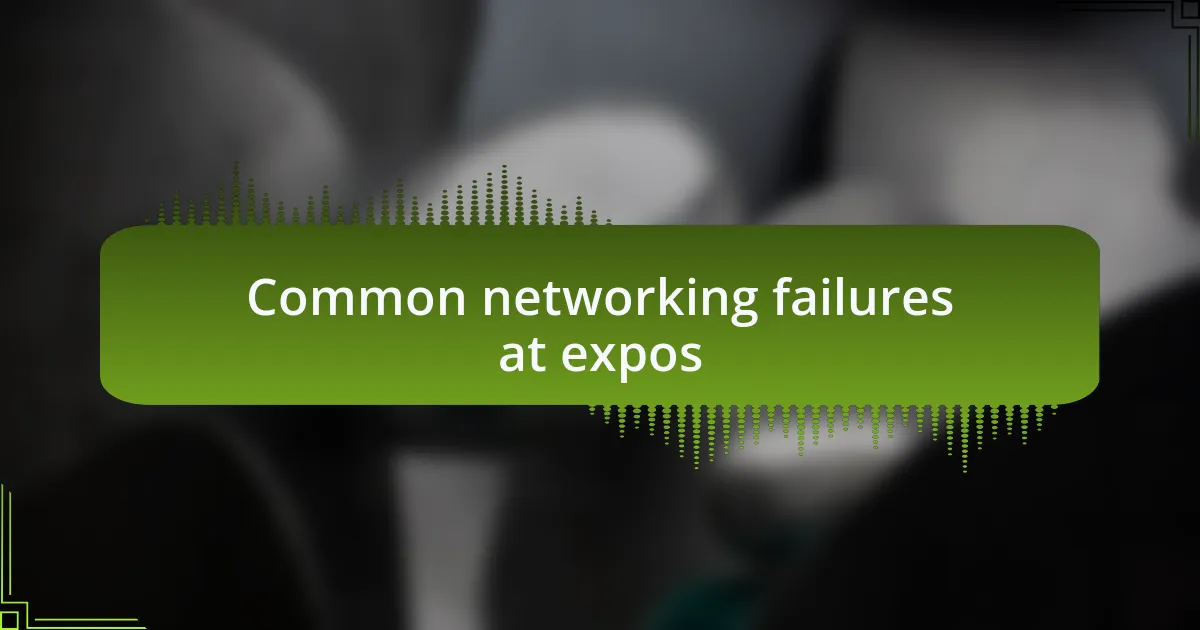
Common networking failures at expos
One common failure I’ve noticed at expos is the tendency to stick to familiar faces. I once attended an event where I spent most of my time chatting with colleagues I already knew. While these conversations were comfortable, I left feeling unfulfilled and regretting missed opportunities to connect with new people. It made me wonder—how often do we allow our comfort zone to hinder our networking potential?
Another pitfall is the lack of preparation. There was an expo I attended without doing my homework on the exhibitors and speakers. I found myself lost, unable to ask meaningful questions or engage in captivating discussions. I realized then that failing to plan is like going into battle without a strategy. How can we expect to forge valuable connections if we haven’t taken the time to know who we want to meet?
Lastly, I often see attendees overwhelm their conversations with overly sales-focused pitches. I remember a time when I was bombarded by a representative who only interested me in their product but didn’t bother to understand my needs. It felt dismissive, and I couldn’t help but think—what if we approached networking as a dialogue rather than a sales pitch? It’s crucial to seek genuine connections rather than just closing deals.
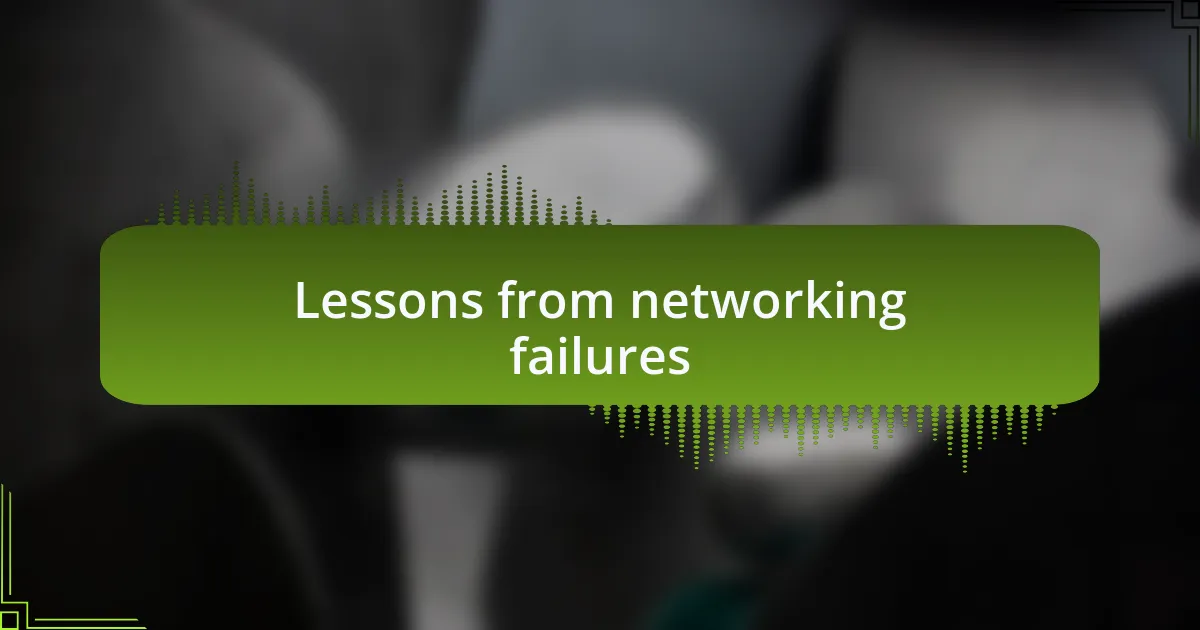
Lessons from networking failures
Networking failures often reveal valuable lessons that can shape our future interactions. One time, I attended a major expo filled with professionals from all walks of life. Instead of mingling with the diverse crowd, I focused on a small group of like-minded attendees. I left feeling disconnected and realized that by avoiding the unknown, I had deprived myself of the richness that diverse connections can bring.
Another lesson I’ve learned is the importance of active listening. During a networking session, I found myself so eager to share my own experiences that I barely absorbed what others were saying. It struck me that genuine connections are fostered when we listen just as much as we speak. How can we adequately address someone else’s needs if we aren’t listening attentively?
Lastly, I vividly remember a networking event where I was too anxious to approach anyone. Instead of pushing through my discomfort, I stayed in my corner, missing the chance to meet remarkable individuals. This taught me that vulnerability can be a strength; by stepping outside of our comfort zones and being open, we create opportunities for authentic connections. Have you ever let nerves hold you back from a meaningful introduction? I know I have, and it’s a reminder that personal growth often happens on the other side of that initial fear.
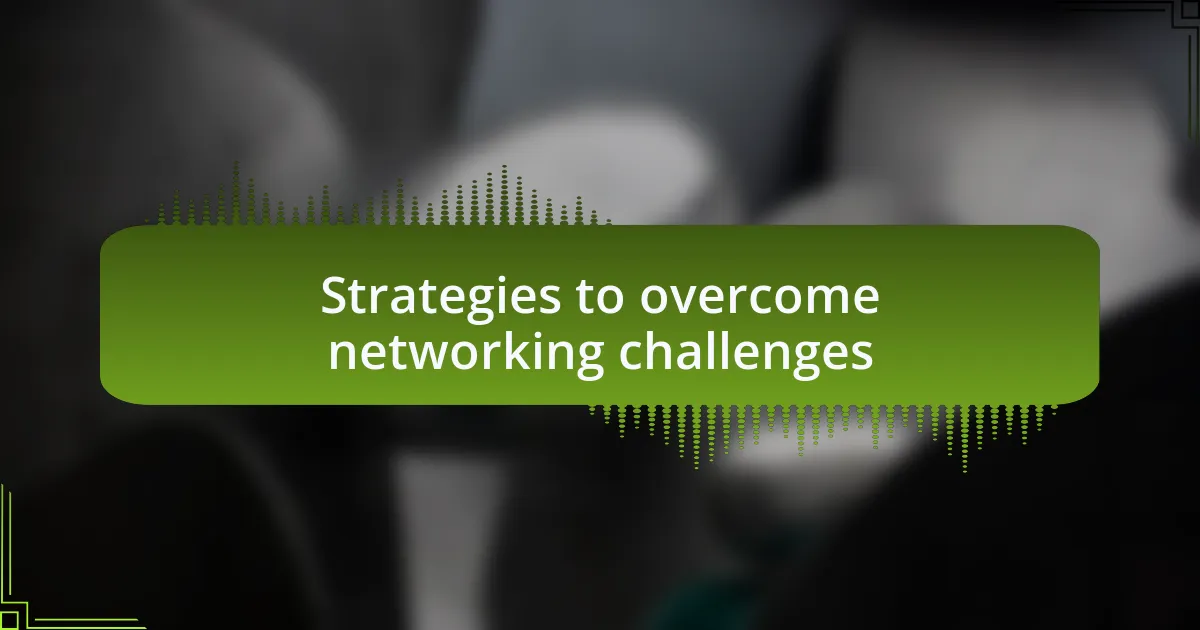
Strategies to overcome networking challenges
Embracing diverse perspectives has transformed my networking approach. At one expo, I made it a point to step out of my comfort zone and attend sessions outside my usual interests. This strategy not only expanded my knowledge but also connected me with individuals who challenged my thinking. Have you considered how much you might grow by engaging with those who approach work differently than you?
Another effective strategy I’ve adopted is practicing active listening during conversations. In one instance, I was so focused on my next talking point that I missed an important cue from the person I was speaking with. Reflecting on that moment helped me recognize the value of pausing and truly hearing what others share. It’s amazing how a simple shift from speaking to listening can create deeper connections. What insights have you gained when you truly tune into someone else’s story?
Finally, I’ve learned the power of follow-up after networking events. After a particularly daunting expo, I felt compelled to reconnect with the speaker who inspired me. Sending a thoughtful message not only reinforced our initial interaction but sparked an ongoing dialogue that proved fruitful. Don’t underestimate the impact of a simple note of appreciation; have you ever followed up with someone and discovered a meaningful opportunity stemmed from that gesture?
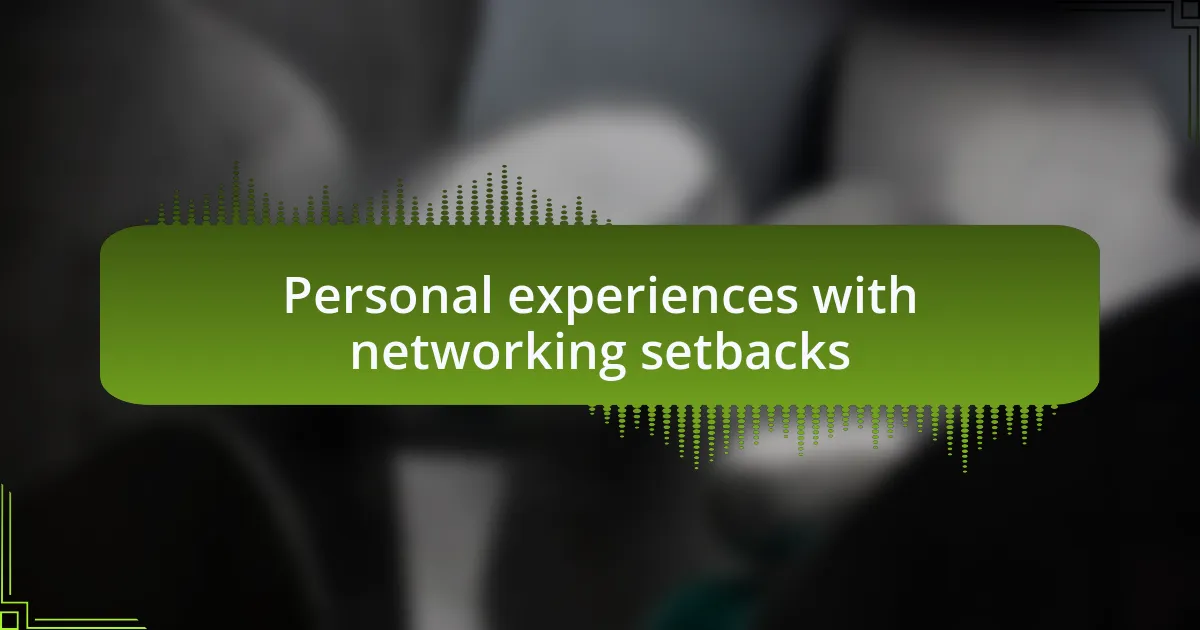
Personal experiences with networking setbacks
In my early networking experiences, I faced several setbacks that felt disheartening at the time. For instance, I remember attending a significant event where I accidentally interrupted a group discussion, causing the participants to exchange awkward glances. That moment not only highlighted my nerves but also taught me the importance of observing social dynamics before jumping in. Have you ever felt the sting of misunderstanding a situation?
At another expo, I was eager to meet a well-known industry leader whom I admired greatly. When I finally approached them, I fumbled my words and ended up sounding less articulate than I had hoped. Despite the embarrassment, it was a wake-up call about preparing for crucial conversations. It made me wonder, how often do we underestimate the impact of practice and preparation in making a memorable impression?
Looking back, I’ve also faced the challenge of low engagement in my follow-ups. After reaching out to several contacts, many responses were lukewarm, leaving me feeling deflated. But with each lackluster reply, I learned to refine my approach and tailor my messages to be more personal and relevant to them. What if a small tweak in how we communicate could lead to deeper connections?